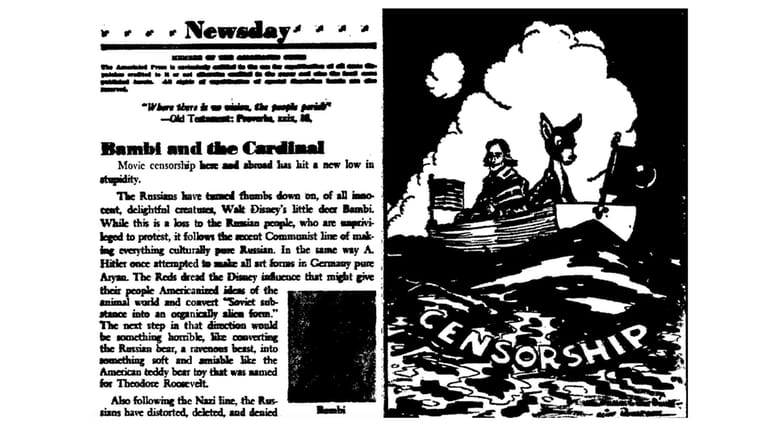Old lies, new battles

The Newsday editorial from Oct. 27, 1948.
The editorial appeared on Oct. 27, 1948, with a title that ranks among the most arresting in Newsday’s history:
“Bambi and the Cardinal.”
It immediately invites flights of imaginative fancy as to the topic which, as it turns out, was movie censorship and distortion around the world. And that, Newsday’s editorial board declared 74 years ago, “has hit a new low in stupidity.”
Russia had recently barred Disney’s “Bambi” from being shown in the country, which the board deemed “a loss” for the Russian people.
“The Reds dread the Disney influence that might give their people Americanized ideas of the animal world and convert ‘Soviet substance into an organically alien form.’ The next step in that direction would be something horrible, like converting the Russian bear, a ravenous beast, into something soft and amiable like the American teddy bear toy that was named for Theodore Roosevelt.”
Long Island’s Teddy Roosevelt.
The board also decried the way Russia had “distorted, deleted, and denied facts of history,” citing as examples the crediting of “great inventions” by Thomas Edison and others to “obscure” Russian inventors.
The board went on to castigate Hollywood for a production of “The Three Musketeers” that depicted the powerful and wily Cardinal Richelieu as the prime minister of France instead of a cardinal of the Catholic Church because of Hollywood “code” that prohibited showing “ministers of religion” as villains.
“Distortion of history has long been a Hollywood sin,” the board wrote. “This is the first time we have noticed it being done for code censorship reasons. As such it is an outrageous corruption of the truth. The precedent set by this deliberate Hollywood fraud is frightening at a time when America is one of the last bastions of freedom.”
While the piece was firmly rooted in the events of the day, it remains relevant to the events of these days.
Distortions of history abound, with the “Big Lie” about the 2020 election and Russian propaganda related to the war in Ukraine being only two of many here and abroad.
China routinely bans or edits films it considers unsuitable — from “Brokeback Mountain” to “Pirates of the Caribbean: Dead Man’s Chest” to “Christopher Robin.” Saudi Arabia censors all sorts of media, from books and newspapers to films and television.
Various countries have blocked their citizens from accessing portions of the internet for political reasons. And the television series “The Crown” is just the latest production to draw criticism for its fictionalized portrayals of real events.
Perhaps the moral of this story is that when it comes to censorship and distortion, the notion of “a new low in stupidity” is actually very old.
— Michael Dobie @mwdobie, Amanda Fiscina-Wells @adfiscina
